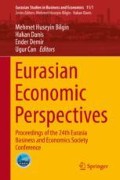Abstract
In this paper we study the direct effects of vocational training upon earnings, and bring empirical evidence for the case of Romania. In order to determine whether vocational training generates an increase in earnings, a quantitative analysis is conducted and econometric tools are applied on both a treatment and a control group. Survey micro-datasets are used together with a probit model, a Kernel matching algorithm and an ordered logit. The main findings are consistent with the international literature in the field, arguing in favor of a positive return on training, as higher earnings are to be expected after attending training programs.
Access this chapter
Tax calculation will be finalised at checkout
Purchases are for personal use only
Notes
- 1.
Gross minimum earnings in Romania were 850 lei in January–June 2014, and increased to 900 lei in July 2014, corresponding to a net minimum earnings of around 678 lei.
- 2.
Net average earnings in September 2014 were 1698 lei.
References
Arulampalam, W., Booth, A. L., & Bryan, M. L. (2004). Are there asymmetries in the effects of training on the conditional male wage distribution? (IZA Discussion Paper, No. 984).
Bartel, A. P. (1995). Training, wage growth, and job performance: Evidence from a company database. Journal of Labor Economics, 13, 401–425.
Becker, G. (1964). Human capital (2nd ed.). New York: Columbia University Press.
Budria, S., & Pereira, P. T. (2004). On the returns to training in Portugal (IZA Discussion Paper No. 1429).
Greenberg, D. H., Michalopoulos, C., & Robins, P. K. (2003). A meta-analysis of government-sponsored training programs. Industrial and Labor Relations Review, 57, 31–53.
Heng, A. B., Cheolsung, P., Haoming, L., Thangavelu, S. M., & Wong, J. (2007). The impact of structured training on workers’ employability and productivity (SCAPE Working Paper Series, Paper No. 2007/02).
Mincer, J. (1958). Investment in human capital and personal income distribution. Journal of Political Economy, LXVI(4), 281–302.
Muehler, G., Beckmann, M., & Schauenberg, B. (2007). The returns to continuous training in Germany: New evidence from propensity score matching estimators. Review of Managerial Science, 1(3), 209–235.
Pirciog, S., Ciuca, V., & Popescu, M. E. (2015). The net impact of training measures from active labor market programs in Romania – Subjective and objective evaluation. Procedia Economics and Finance, 26, 339–344.
Popescu, M. E., & Roman, M. (2018). Vocational training and employability: Evaluation evidence from Romania. Evaluation and Program Planning, 67, 38–46.
Regner, H. (2002). The effects of on-the-job training on wages in Sweden. International Journal of Manpower, 23, 326–344.
Rodriguez-Planas, N., & Benus, J. (2006). Evaluating active labor market programs in Romania (IZA Discussion Paper Series, No. 2464).
Roman, M., & Popescu, M. E. (2015). The effects of training on Romanian migrants’ income: A propensity score matching approach. Economic Computation and Economic Cybernetics Studies and Research, 43(1), 85–108.
Acknowledgements
The authors would like to thank the Romanian National Scientific Research Institute for Labor and Social Protection (INCSMPS) for providing access to the micro-survey database. The authors would also like to thank Webster University Thailand for financially supporting this research.
Author information
Authors and Affiliations
Corresponding author
Editor information
Editors and Affiliations
Rights and permissions
Copyright information
© 2019 Springer Nature Switzerland AG
About this paper
Cite this paper
Popescu, M.E., Paun, RM. (2019). The Financial Benefits of Training on the Labor Market: Evidence from Romania. In: Bilgin, M., Danis, H., Demir, E., Can, U. (eds) Eurasian Economic Perspectives. Eurasian Studies in Business and Economics, vol 11/1. Springer, Cham. https://doi.org/10.1007/978-3-030-18565-7_1
Download citation
DOI: https://doi.org/10.1007/978-3-030-18565-7_1
Published:
Publisher Name: Springer, Cham
Print ISBN: 978-3-030-18564-0
Online ISBN: 978-3-030-18565-7
eBook Packages: Economics and FinanceEconomics and Finance (R0)

